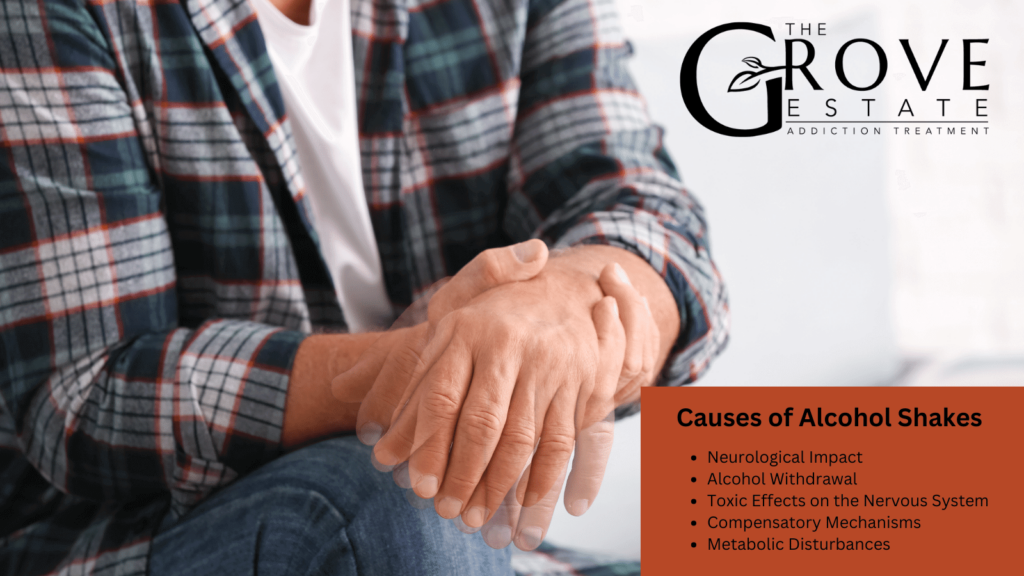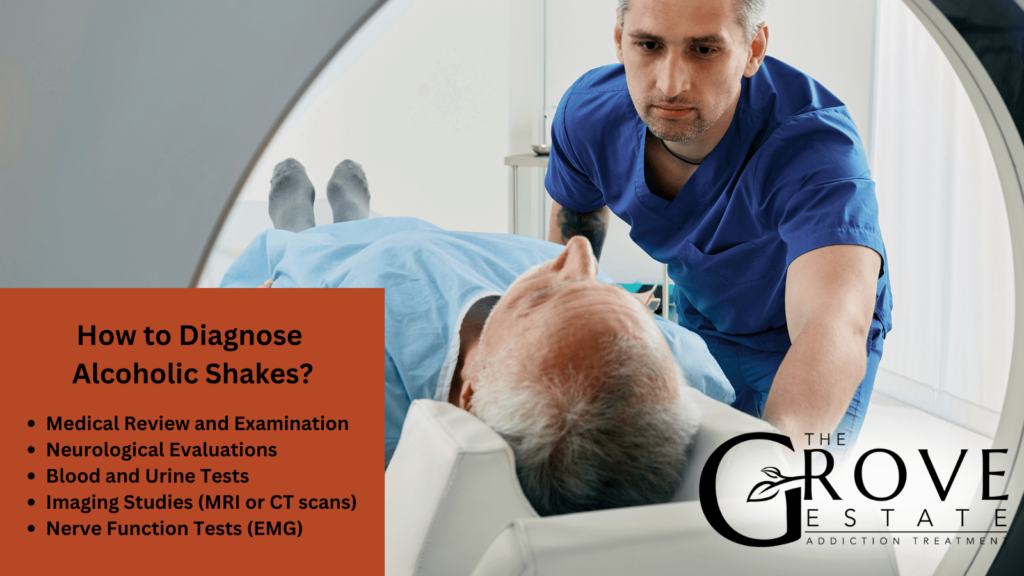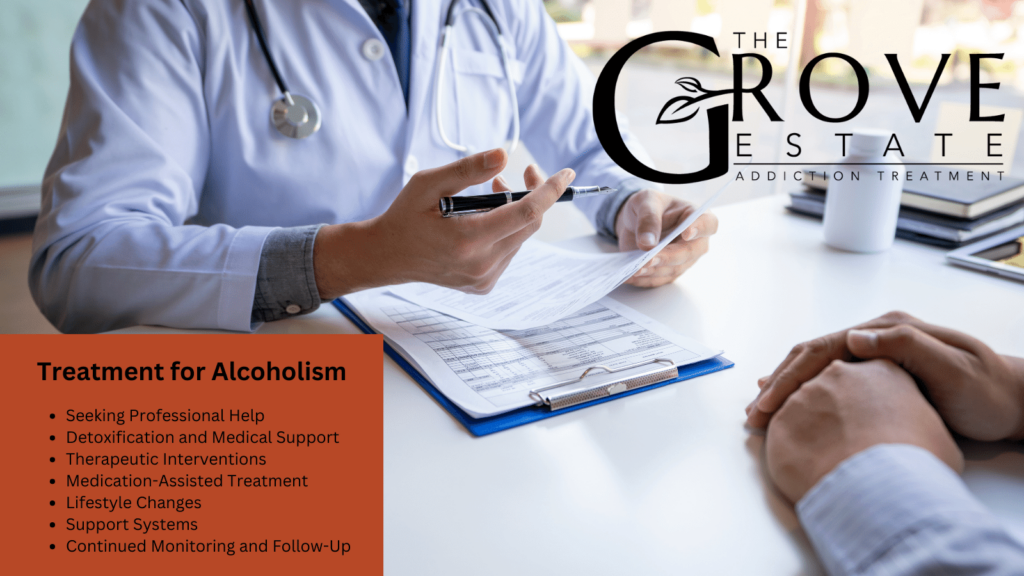Alcohol-induced tremors, commonly known as uncontrolled shakes, are a frequent and distressing symptom experienced by individuals with a history of chronic alcohol abuse. These tremors are often a result of alcohol’s detrimental effects on the nervous system. According to a study published in the Journal of Neurology, Neurosurgery, and Psychiatry, approximately 70% of patients with chronic alcoholism develop some form of tremor.
Alcohol shakes can vary in severity and often become more pronounced during withdrawal periods or after prolonged drinking sessions. Understanding the underlying causes of these tremors, including neurological impact, withdrawal effects, and other contributing factors, is essential for addressing and managing this condition effectively.
What are Alcohol Shakes and Tremors?
Alcohol shakes, or tremors, are involuntary, rhythmic movements that commonly occur in the hands, but can also affect other parts of the body. They are associated with excessive alcohol consumption and the withdrawal process when alcohol use is reduced or stopped. These tremors result from alcohol’s interference with neurotransmitter pathways in the brain, disrupting normal communication between nerve cells. Over time, chronic alcohol consumption can lead to persistent changes in brain function, contributing to the development of tremors even when alcohol is not being consumed. The severity and occurrence of these tremors can be indicative of the extent of alcohol’s impact on the individual’s nervous system.

What Causes Alcohol Shakes?
Alcohol shakes, or tremors, are primarily caused by the effect of alcohol on the brain’s neurological functions. Here are the key factors involved:
- Neurological Impact: Alcohol affects the brain’s neurotransmitters, chemicals that facilitate communication between nerve cells. Chronic alcohol consumption can disrupt this balance, leading to impaired motor control and tremors.
- Alcohol Withdrawal: Shakes are a common symptom of alcohol withdrawal, as the body becomes dependent on alcohol to maintain neurotransmitter balance. When alcohol is suddenly removed, the nervous system becomes hyperactive, resulting in tremors.
- Toxic Effects on the Nervous System: Alcohol has a toxic effect on nerve cells, and prolonged exposure can cause damage to the nervous system, which may manifest as tremors.
- Compensatory Mechanisms: The body tries to compensate for the depressive effects of alcohol on the brain by increasing activity in certain neural pathways, leading to an overactive nervous system that causes shakes.
- Metabolic Disturbances: Alcohol abuse can lead to metabolic imbalances, such as changes in blood sugar levels, which can also contribute to tremors.
How Does Alcohol Withdrawal Trigger Shakes?
Alcohol withdrawal triggers shakes due to the sudden decrease in alcohol intake after a period of heavy and prolonged use, causing the nervous system to become hyperactive. When a person regularly consumes alcohol, the body adjusts to its depressant effects by increasing the activity of excitatory neurotransmitters. Once alcohol is removed, these neurotransmitters remain in an overactive state, leading to symptoms such as tremors or shakes.
The process of alcohol withdrawal typically begins 6 to 24 hours after the last drink. The severity and duration of symptoms can vary based on factors like the length and intensity of alcohol use. Initial symptoms include anxiety, tremors, sweating, nausea, and insomnia, which can escalate to more severe effects like hallucinations, seizures, and delirium tremens in significant cases. The acute phase of withdrawal can last from a few days to a week, but milder symptoms like shakes may persist for several weeks as the body gradually returns to a state of equilibrium.
What is the Difference Between Alcohol Shakes and Delirium Tremens?
Alcohol shakes, or alcohol-induced tremors, and delirium tremens (DTs) are both symptoms associated with alcohol withdrawal, but they differ significantly in their severity and medical implications.
Alcohol Shakes:
- These are tremors or involuntary shaking, often seen in the hands, that can occur in individuals who have consumed excessive amounts of alcohol and then suddenly stop or significantly reduce their alcohol intake.
- Alcohol shakes are considered a common and relatively mild symptom of alcohol withdrawal. They typically begin within a few hours to a few days after the last drink and can last for several days to a few weeks.
Delirium Tremens (DTs):
- DTs represent a severe form of alcohol withdrawal characterized by sudden and severe mental or nervous system changes like rapid changes in heart rate and body temperature.
- Symptoms of DTs include severe agitation, confusion, hallucinations, high blood pressure, fever, and in extreme cases, seizures.
- DTs are considered a medical emergency and occur in a small percentage of individuals undergoing withdrawal, usually appearing 48 to 96 hours after the last drink but can occur up to 10 days later.
- The condition can be life-threatening, with a high risk of complications without prompt medical treatment.
The primary differences lie in the severity and potential health risks. While alcohol shakes can be uncomfortable and signify the need for medical attention and support during withdrawal, delirium tremens is a critical condition requiring immediate and intensive medical intervention.

How to Diagnose Alcoholic Shakes?
Diagnosing alcoholic shakes involves a medical review and examination to assess alcohol use and tremor characteristics. Neurological evaluations help rule out other causes of tremors. Blood and urine tests check for alcohol levels, liver function, and nutritional deficiencies. Sometimes, imaging studies like MRI or CT scans and nerve function tests like EMG are used to examine brain and nerve activity. This thorough assessment helps differentiate alcoholic shakes from other conditions, ensuring appropriate treatment and management of related health issues.
Are Alcohol Shakes Permanent?
Alcohol shakes, or tremors, are not necessarily permanent but their reversibility largely depends on several factors. The duration and severity of alcohol use play crucial roles, shorter periods of heavy drinking might result in tremors that can resolve with abstinence and appropriate treatment. However, long-term alcohol abuse may lead to more persistent or even permanent shakes due to lasting nerve damage.
The individual’s overall health, the presence of co-existing medical conditions, and the effectiveness of the treatment plan also significantly influence the longevity of alcohol shakes. Early intervention, including cessation of alcohol intake, medical management of withdrawal symptoms, and addressing nutritional deficiencies, can improve the chances of reducing or eliminating the tremors.
What is the Treatment for Alcohol-Related Shakes?
Treating alcohol-related shakes involves a combination of medical and therapeutic interventions aimed at managing and reducing the tremors. Key strategies include:
- Medical Management: Medications such as beta-blockers or anti-seizure drugs may be prescribed to help control the tremors. In cases where shakes are part of alcohol withdrawal, benzodiazepines might be used to alleviate symptoms and prevent complications.
- Detoxification: Safe withdrawal from alcohol under medical supervision is crucial. Detox programs provide the necessary support to manage withdrawal symptoms effectively and reduce the risk of severe tremors.
- Nutritional Support: Addressing nutritional deficiencies, often seen in chronic alcohol users, is essential. Supplements like B vitamins, magnesium, and thiamine can aid in nerve health and potentially reduce tremors.
- Physical Therapy: Exercises and physical therapy can strengthen muscles, improve coordination, and reduce the severity of shakes.
- Lifestyle Modifications: Reducing or abstaining from alcohol, adopting a healthy diet, engaging in regular physical activity, and managing stress can all contribute to decreasing the frequency and intensity of alcohol-related shakes.
- Psychological Counseling: Therapy can help address underlying issues related to alcohol use and teach coping strategies to manage stress and triggers that may lead to drinking and subsequent tremors.
What are the Health Risks of Alcoholic Shakes?
Alcohol shakes can be associated with various health risks and long-term effects. The repetitive and involuntary shaking of the hands or other parts of the body can lead to difficulties in performing daily activities and tasks that require fine motor skills. Prolonged alcohol-related tremors may contribute to muscle weakness, coordination problems, and an increased risk of falls or accidents.
Additionally, the constant stress on the nervous system from tremors can lead to heightened anxiety and emotional distress. Over time, chronic alcohol abuse and the resulting tremors can exacerbate existing health conditions, such as liver disease, cardiovascular issues, and nutritional deficiencies. Therefore, addressing alcohol shakes not only involves managing the immediate symptoms but also mitigating the potential long-term health complications associated with prolonged alcohol misuse and its effects on the nervous system.
How to Prevent Alcohol Shakes?
Preventing alcohol shakes involves implementing measures to minimize the risk of their onset in individuals with a history of alcohol misuse. Early intervention and moderation in alcohol consumption are crucial components of prevention strategies. These measures include:
- Moderation in Alcohol Consumption: Limiting alcohol intake to recommended levels and avoiding excessive or binge drinking can reduce the likelihood of developing alcohol shakes.
- Seeking Early Intervention: Recognizing the signs of alcohol dependence or withdrawal and seeking help from healthcare professionals can lead to early intervention and effective management of alcohol-related issues before they escalate.
- Balanced Nutrition: Maintaining a healthy diet rich in essential nutrients, especially B vitamins and magnesium, can support nerve health and minimize the risk of tremors associated with nutritional deficiencies.
- Regular Physical Activity: Engaging in regular exercise and physical activity can improve overall health, reduce stress, and contribute to better nervous system function, potentially reducing the occurrence of alcohol-related tremors.
- Stress Management: Developing healthy coping mechanisms for stress and avoiding situations that trigger excessive alcohol consumption can help prevent the onset of shakes in individuals prone to alcohol-related issues.

How can Alcoholics Recover and Receive Support?
Recovery from alcoholism and addressing associated shakes involves several crucial steps and support systems. Seeking professional help from healthcare professionals, including doctors and therapists, is essential for developing a personalized recovery plan. Detoxification under medical supervision can manage withdrawal symptoms, including shakes, while addressing nutritional deficiencies. Engaging in therapeutic interventions such as individual or group therapy, cognitive-behavioral therapy (CBT), and medication-assisted treatment can help individuals address underlying issues, learn coping strategies, and prevent relapse.
Adopting a healthy lifestyle, including regular exercise, balanced nutrition, and stress management, supports long-term recovery. Support systems like Alcoholics Anonymous (AA) and family therapy provide encouragement, accountability, and understanding during the recovery journey. Continued monitoring, follow-up appointments, and adherence to treatment plans are crucial for sustained recovery and addressing any challenges or relapse risks.
What treatment options are available for alcoholic shakes?
Treatment may include medication to manage withdrawal symptoms, detoxification under medical supervision, nutritional support, physical therapy, and addressing underlying health issues.
Do support systems play a role in recovering from alcoholic shakes?
Yes, engaging with support groups, therapy, and healthcare professionals is crucial for addressing alcohol dependency, managing shakes, and achieving lasting recovery.
What is the importance of lifestyle changes in reducing alcoholic shakes?
Lifestyle changes such as regular exercise, balanced nutrition, stress management, and avoiding alcohol triggers can support nerve health and minimize the occurrence of alcoholic shakes.
Can individuals with alcoholic shakes lead a normal life after recovery?
With appropriate treatment, support, and lifestyle changes, many individuals can successfully overcome alcoholism, manage alcoholic shakes, and lead fulfilling lives in recovery.
How can family support impact recovery from alcohol shakes?
Family support plays a critical role in the recovery process from alcohol shakes, providing emotional stability, understanding, and encouragement that can significantly enhance the effectiveness of treatment. Families can help create a supportive home environment that minimizes stress and alcohol exposure, both of which are crucial for individuals recovering from alcohol dependency. Involvement in therapy sessions, such as family counseling, can also facilitate better communication, address relational issues stemming from alcohol use, and foster a deeper understanding of the challenges faced during recovery.
Moreover, families can actively participate in the recovery journey by encouraging healthy lifestyle changes, attending support group meetings together, and learning about alcoholic parents and the broader impacts of alcoholism on family dynamics. This holistic approach not only aids in managing the symptoms of alcohol shakes but also supports the overall well-being of the individual, making the path to recovery more manageable and less isolating.
What is the significance of aftercare in managing alcohol shakes?
Aftercare is a vital component of the recovery process for individuals experiencing alcohol shakes, as it provides continued support and resources necessary for long-term sobriety and health. Aftercare programs, which may include ongoing therapy, support groups, and aftercare facility services, offer a structured environment where individuals can strengthen their coping mechanisms, address relapse triggers, and maintain the progress achieved during initial treatment phases. These programs are designed to help individuals navigate the challenges of reintegrating into daily life without reliance on alcohol, minimizing the risk of relapse and the recurrence of alcohol shakes.
The consistent support provided through aftercare encourages individuals to remain committed to their recovery goals, promoting sustained abstinence from alcohol, which is crucial for the alleviation of alcohol shakes. By engaging in aftercare services, individuals can continue to receive guidance and support as they build a healthier, alcohol-free life, ensuring that the tools and strategies learned during treatment remain effective over time.

Share This Post



